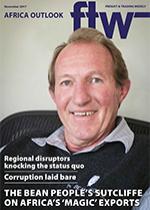Corruption watchdogs are adamant that bribery and corruption must be exposed to be eliminated, but speaking openly about it has resulted in victimisation for several transporters, traders and agents based at Southern African Development Community (SADC) borders. FTW decided to kick the hornet’s nest and invite anonymous comments, uncovering a few surprising revelations. In which countries do bribery and corruption occur most frequently? Zimbabwe’s Beitbridge border post – the busiest in sub-Saharan Africa – was named as the most corrupt border post, while Zimbabwe and Mozambique were revealed to be the most corrupt countries by those who responded to this question. Which officials are the most corrupt? A South African Revenue Service (Sars) insider suggested FTW pose this question to respondents, pointing out that while many would blame officials from other countries, South African officials were also not averse to being bribed to fast-track a shipment clearance or look the other way for a roadworthy violation. Respondents did not single out specific border agency officials as being any more corrupt than their counterparts, highlighting instead that all were corrupt. “Take Beitbridge for example where I am a frequent traveller – immigration, customs, border police, Vehicle Examining Department (VED) officials, plant inspectors, soldiers are equally corrupt,” said one transport operator. “Corruption by Zimbabwe government employees is a cancer that has reached incurable proportions,” said a trader based in Zimbabwe, adding security guards to the list of culprits. “When you enter and exit the search zone you have to grease the security guards’ palms for them to remove the barricade cone,” he said. A transporter who regularly transits Mozambique had another take on this issue. “The biggest culprits are the ones not following the rules who get caught and pay the official a smaller bribe to avoid the fine. If everyone would pay the proper fine, there would be much less harassment,” he told FTW. He said it also helped to properly understand a country’s laws so that drivers could judge for themselves when they were being fined for a bogus offence. He said he had often declined the blatant request for a bribe by saying they would need to lock him up because he didn’t have the cash on hand. “They generally just let me go anyway,” he said. Third party players FTW has learnt that in Zimbabwe, third parties have entered the fray as unofficial “corruption transactors”, commonly referred to as “guma gumas”, who will be informally employed by drivers waiting in the queue to run up to the border post and pay officials to ensure a fasttracked clearance. “The bulk of South African transporters do have Zim runners who run around with papers to clearing agents and so forth,” said a clearing agent, highlighting that these runners also perpetuated the problem by scaring drivers into believing they would be dramatically delayed if they did not pay the bribe. “Drivers who are paid according to how many kilometres they clock up in a month will happily pay the money – and of course the guma gumas get their cut,” he explained. What happens if bribes aren’t paid? Drivers and/or the companies they work for are often targeted if they become known for not paying bribes and will inevitably be exposed to more frequent stops and cited for violations such as unroadworthy vehicles and expired cross-border permits amongst others. A Maputo-based transport broker commented that often shippers were not even aware that their transport operators paid these bribes. “But with increased competition, drivers will pay the bribes rather than risk not meeting a delivery target and be penalised for not meeting customer expectations,” he told FTW. What do bribes cost on average? Many respondents were hesitant to reveal the exact amounts but did note that South African drivers were more commonly targeted as they were perceived to be wealthier than their neighbouring counterparts. One operator was more forthcoming, pointing out that drivers travelling from Gauteng to the northern borders should keep around R2 000 on them, provided they had a cross-border permit. “Without the permit it could be up to twice that amount,” he said. He added that on the Zimbabwe side, within the border search zone, there were around 10 government groups who should be paid at least R100 each. “There are also close to 13 roadblocks leading up to Harare, and at each roadblock drivers should expect to pay R100 to continue their journey,” he said. Proposed solutions The widespread cross-border corruption is reportedly often used an excuse for transporters to raise rates, according to some respondents, suggesting therefore that all culprits – including those who pay the bribes – be publicly named and shamed. “Long-distance haulier associations should lobby the respective governments to work together to expose and prosecute offenders,” said one operator, adding that the media could also play a part in exposing the scourge, as could various chambers of commerce and industry who could speak collectively on behalf of the industry. Other proposed solutions included the establishment of a special task team – consisting of neutral parties from all SADC countries representing, amongst others, police, prosecutors etc – to crack down on the scourge. Most believed full transparency of all transactions was the way to go, with cameras strategically placed to record officials and drivers from all angles.

